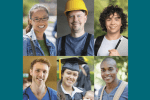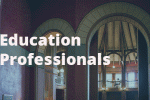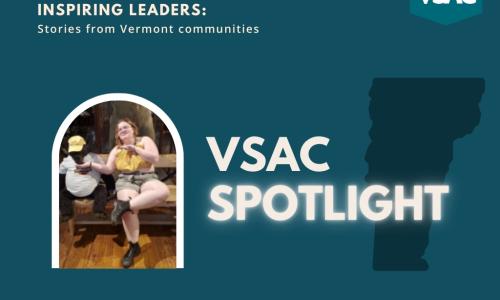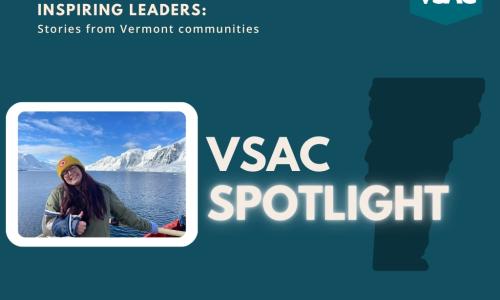Planning for college or training this year? Apply for the Vermont Grant.
Thinking about college or training next year? It’s time to file the 2025-26 FAFSA!

“Schools may have money for you. You just have to ask for it,” says David Richardson of Danville. David worked full time all through high school, not to save for college, but to help cover his family’s living expenses after his father became disabled. He was determined to go to college, but wasn’t sure he could afford it.
By filling out the FAFSA (Free Application for Federal Student Aid), colleges and scholarship granting organizations were able to verify his family’s financial situation and get David the assistance that allowed him to continue his education. He’s now a senior at the University of Vermont, where he’s been active in student government and as a mentor for other students from modest-income backgrounds. His advice: always ask, because you never know.
Filling out the FAFSA is the most important way to make that “ask,” and the new form for the 2025-26 academic year is now available. It’s the first step toward financial aid for many colleges or training programs after high school. And now that the FAFSA for the next full academic year is open, it’s time to file your application.
The FAFSA is a must for Vermonters of any age—from current high school seniors to working adults who are considering continuing their education or training in 2025—in any of these programs:
- College or University: Public, private, two-year, and four-year institutions
- Graduate and Professional Schools: Master’s, doctoral, and law programs
- Select Non-Degree Programs: Education programs that qualify for federal aid
Despite its name, the FAFSA isn’t just for federal student aid. If you’re a Vermont student, filing your FAFSA also allows you to be considered for:
- Grants offered by federal, college, and state aid programs, including the Vermont Grant;
- Scholarships,
- Military funding,
- Funding for job training in certain high-demand fields, and
- 802Opportunity, which offers free tuition at Community College of Vermont for eligible students.
F.A.F.S.A. Benefits
Here are five key benefits of completing the FAFSA, from financial aid opportunities to unlocking educational pathways.
1. F - Free money
If you don’t complete the FAFSA, you may be leaving free student aid on the table. The FAFSA may lead to federal aid, as well as grants and scholarships. If you’re paying completely out-of-pocket, you may be overpaying for education and depleting funds that you could use for other things, like housing or living expenses. If you’re eligible for free aid, college and career training will be more affordable now and in the long run.
Every dollar saved is a dollar not spent. Amanda Southwick beat addiction—and motherhood inspired her to return to school as an adult so she could help counsel others. “VSAC was the first place I called when I started thinking about going back to school. They’ve been so helpful in setting me up with grants and scholarship opportunities so I can afford it. I really owe a lot of my academic success to them,” notes Amanda.
Filing your FAFSA is also free. There is never a cost to complete the application. The 2025-26 FAFSA references 2023 tax documents. The form is filed online, and it usually takes less than 30 minutes to complete.
2. A - Accessible – and VSAC offers support
Some families may have questions or challenges around those application requirements, and if so, VSAC is here to help.
Lizzie Vaughan, who is now studying agricultural business at SUNY Cobleskill, grew up on a dairy farm in South Ryegate. She remembers that even though her parents also went to college, today’s fully digital application platforms left them feeling ill-equipped to help her with her submissions. “I had no idea, and my parents had no idea. My mom said, ‘We did all this with typewriters!’” Lizzie recalls. “VSAC helped me a lot with the Common App, the FAFSA, and scholarship applications.”
3. F - Flexible Aid
The FAFSA opens doors to different types of aid, including scholarships, grants and forgivable loans, military funding, and, as a last resort, loans.
Tuition was a financial reach for Olivia Demag, who is financing her education on her own. VSAC helped her find scholarship and forgivable loan opportunities, and Olivia proudly shares that those efforts have helped her cover 75% of her tuition. The program she promotes most loudly is the Vermont Forgivable Loan Program for nursing students, which erases one year of student loans for each year worked in Vermont after graduation. “I can't preach it enough to people. It’s huge. And it’s made me work harder.”
4. S -Supports Education Goals
What does your “tomorrow” look like? No matter what career or job you see yourself in, filing the FAFSA brings you closer to that dream. And the free aid you may receive lessens the long-term costs of education.
Amon Chumba, who emigrated to the United States from Kenya just before his senior year of high school, says the FAFSA gave his family a headache. “We had only been in this country for a year, so we didn’t have prior-year tax forms. I had several meetings with Jessi, [my VSAC Outreach Counselor,] when it came time to fill it out. It was a relief when that went through.” When it comes to academics, Amon acknowledges he’s a high achiever. “I’m someone who wants to do really well on every test,” he says.
5. A - Annual Opportunity
College and training programs recommend filing a FAFSA as soon as possible. If you’re a high school senior, adult student, or still unsure if you can afford to continue your education, the time to file the FAFSA may be now. Students need to file a FAFSA every fall to apply, or re-apply, for financial aid for the upcoming academic year.
Need help filing the 2025-26 FAFSA?
If you need help filing your FAFSA or have questions about financial aid, VSAC is here to help. We have counselors available to assist you in person or virtually, free of charge. Virtual meetings are offered Monday-Thursday; in-person meetings are available in Winooski on Tuesdays and Thursdays. Learn more and schedule a free appointment with a VSAC counselor for help completing your FAFSA.
Whatever your circumstances, don’t let uncertainty stop you. If you’re still on the fence about pursuing college or training next year, or if you’re not sure you’ll be eligible for any financial aid, apply anyway. As UVM student David Richardson says, “The worst they can say is no.”






